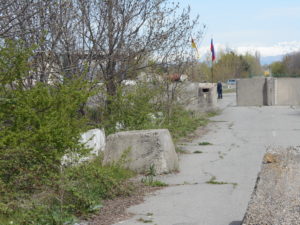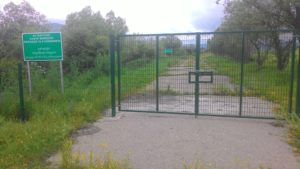

 The de facto republic of South Ossetia is considering opening up trade with the rest of Georgia. However, the proposals are meeting resistance from those opposed to trading with their ‘enemy’.
The de facto republic of South Ossetia is considering opening up trade with the rest of Georgia. However, the proposals are meeting resistance from those opposed to trading with their ‘enemy’.
A statement made by chairman of the Customs Committee of the de facto Republic of South Ossetia, Murat Tskhovrebov, on the possible creation of a customs office for goods from the rest of Georgia in the town of Akhalgori, has caused endless discussion among Ossetians on social networks. Tskhovrebov also didn’t rule out the possibility of reopening the Transcaucasian highway for cargo.
The Transcaucasian highway was a road connecting the South Caucasus with Russia through Tskhinvali and the Roki Tunnel, which bridges South Ossetia and North Ossetia. It was constructed during Soviet times as an alternative to Georgia’s Military Highway, which passes through Kazbegi and Larsi. The road is now blocked by Russian border guards near the village of Ergneti on the Georgian–South Ossetian administrative boundary line. Ergneti was famous for its market until 2004, when it was closed by Georgian authorities in order to ‘fight smuggling’. This event increased tensions in the conflict zone at the time.
The de facto government blocked the roads in and out of South Ossetia following the August 2008 war. The only exception was in Akhalgori, where locals have special passes to cross the border. The Akhalgori checkpoint eventually opened up to cargo too, but this has remained limited.
One person can transport no more than 50 kg of goods, but the number of Georgian products on Tskhinvali’s market has gradually increased nonetheless, as Georgian products often cost less than those from Russia.

In Tskhinvali, those in favour of opening the Transcaucasian highway claim that this will bring in budget revenues for the de facto republic, but the the project’s opponents believe that since the republic is at war with Georgia, to trade with it would be against the interests of South Ossetia, because Georgia won’t sign an agreement on nonuse of force.
The de facto government has admitted that ‘Georgian contraband’ is available on the market, but has made no effort to prevent this, and the volume of such goods has kept increasing. The volume has increased to such an extent that some Ossetian vendors have begun selling Georgian fruit and vegetables in Russia, marketing them as being harvested in Tskhinvali.
Tamar Mearakishvili, a resident of Akhalgori, told OC Media that over the New Year celebrations alone, tens of vehicles moved from Akhalgori to Tskhinvali. She says that the de facto government has admitted that tens of tonnes of goods were transported from Tbilisi to Tskhinvali.
The Customs Committee chairman’s statement makes it clear that despite the integration processes with Russia, South Ossetia’s economy is still dependent on Georgian products.
Further details about the customs office — tariff rates, procedures for customs clearance, etc. — are not yet known. During the last Incident Prevention and Response Mechanism meeting in Ergneti, David Sanakoyev, head of the Ossetian delegation, didn’t wish to comment on this issue, but said that if this issue will become necessary for discussion with the Georgian party, they will put it on the agenda.
What the customs office would mean for the government in Tbilisi remains unclear. Kakhaber Kemoklidze, Deputy Chair of the Analytical Centre of the State Security Service, told OC Media that the activity of any body claiming to be acting in an official capacity on the occupied territory will be illegal, but that the most important thing for the Georgian government is that the local population do not have problems with movement.
If the new customs office does indeed open, Georgian products will likely become more expensive in South Ossetia, however government revenues will increase. Individual officials are also likely to benefit, considering the high levels of corruption in the de facto republic.
In spite of all of this, the most important thing for people in Akhalgori is that they are able to transport goods to the occupied territory without dealing with problems.
Back in 2009, civic activist Temur Tskhurbati first publicly raised the idea of transporting goods along a Transcaucasian Highway, through the blocked roads. This was soon after the conclusion of the 2008 Russo-Georgian War. He thought that South Ossetia had the potential to receive huge revenues as a transit corridor for goods passing between the North and South Caucasus.
Back then, Tskhurbati was widely condemend as a traitor and for undermining South Ossetian interests. However, eight years after the war, the de facto government has began to discuss this idea themselves.
One thing is is clear however, the authorities in South Ossetia will not go ahead with the plan without first obtaining agreement from the Kremlin.
All place names and terminology used in this article are the words of the author alone, and may not necessarily reflect the views of OC Media’s editorial board.







